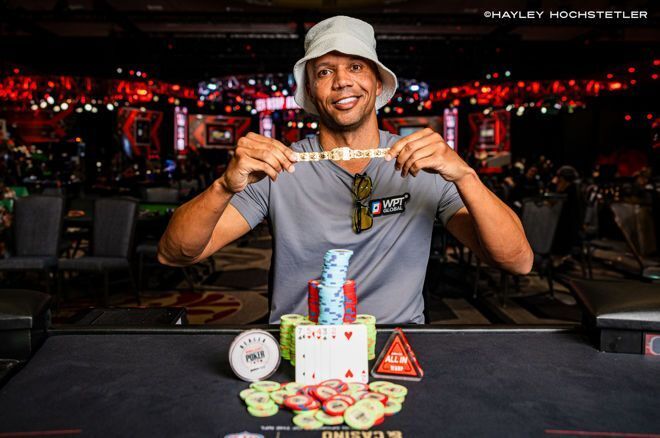Ivey’s Childhood and First Steps in the Poker World
Phillip Dennis Ivey Jr. was born on February 1, 1977, in Riverside, California, but his family soon moved to Roselle, New Jersey. As a child, he was quiet and reserved, but his competitive spirit and strategic thinking became apparent early on.
He learned the fundamentals of card games from his grandfather, who played five-card stud with him. Initially, his grandfather deliberately let him win to maintain his interest, but he soon realized it wasn’t necessary—his grandson had an instinctive understanding of the game.
His passion for poker grew stronger during his teenage years, though his parents worried he was spending too much time at the card tables. While his peers were preparing for college, Ivey was already determined to become a professional poker player.
The Atlantic City Era: "No Home Jerome"
Since the minimum age for casino gaming in the United States is 21, young Ivey obtained a fake ID under the name "Jerome Graham" to gain entry into Atlantic City poker rooms.
He invested all his savings into the game, suffering repeated losses at first, but his determination remained unshaken. During the day, he worked as a telemarketer to finance his nighttime poker sessions, and at night, he honed his skills at the casino tables. Often, he missed the last bus home and had to sleep under the boardwalk near the casino. Seeing this, local poker players nicknamed him "No Home Jerome," as he seemed to live in the casino and had no home outside of it.
In 1998, upon turning 21, he announced in the poker room of the Taj Mahal casino that he would no longer respond to "Jerome"— his real name was Phil Ivey. Despite this, the nickname stuck with him throughout his career, but it was under his real name that he became a legend.
Early Success and WSOP Breakthrough
Ivey's true breakthrough came in 2000 at the World Series of Poker, where he won his first WSOP bracelet in the $2,500 Pot Limit Omaha event. He defeated some of the greatest players of the era, including Amarillo Slim in heads-up play. This victory made him one of the youngest WSOP champions at the time.
Following this success, Ivey rose to the top at an astonishing pace. In the following years, he became a regular in the Bellagio Big Game, competing against the world’s best cash game players while also adding to his collection of WSOP bracelets. In 2002, he won three bracelets, further cementing his status as one of the game's elite.
The Full Tilt Era: Online Dominance and Poker’s Golden Age
By the mid-2000s, Phil Ivey had established himself as an unshakable figure in live poker, but he also became one of the most feared players in online high-stakes cash games. Following the 2003 "Moneymaker effect", poker experienced unprecedented growth, and online traffic reached record highs.
The hub of high-stakes cash games at the time was Full Tilt Poker, where the world's best players clashed at nosebleed stakes. This was where Ivey built his online legacy. Although he was primarily a live player, his ability to dominate even the toughest online specialists showcased his exceptional talent and versatility.
Several factors made Ivey’s playing style extraordinarily effective:
- Unmatched Reading Ability – Even though he couldn’t see his opponents’ reactions online, he had an uncanny sense of game rhythm and could detect weaknesses.
- Aggressive but Calculated Attacks – Unlike Tom "durrrr" Dwan, who was known for hyper-aggression, Ivey’s attacks were precise, and his opponents rarely found a counter-strategy.
- Versatility – He wasn’t just a master of No Limit Hold’em; he was also among the best in Pot Limit Omaha, 2-7 Triple Draw, and mixed games.
Some estimates suggest that Ivey won over $20 million at the Full Tilt cash game tables, making him one of the most successful players in online poker history.
The Fall of Full Tilt Poker and Ivey’s Ordeal
On April 15, 2011, the U.S. Department of Justice shut down the largest online poker sites, including Full Tilt Poker. This event is known in the poker world as Black Friday.
During the investigation, it was revealed that Full Tilt did not have sufficient funds to cover player balances. Around $330 million of player funds were locked on the site, while Full Tilt had only $60 million in liquid capital. Authorities determined that the site's financial mismanagement led to insolvency, as it operated similarly to a Ponzi scheme—using deposits from new players to cover withdrawals. Additionally, the management had made private withdrawals from player funds.
The scandal shook the online poker industry, causing widespread distrust among players.
The case was resolved in 2012, when PokerStars acquired Full Tilt Poker in a $590 million settlement and agreed to reimburse player balances.
Ivey publicly distanced himself from Full Tilt’s leadership and filed a lawsuit to break free from his contract. Although he was not part of the site’s management, he was one of its most recognized faces, making it impossible to separate his name from the scandal. As a result, the controversy had a significant negative impact on his career.
Macau High-Stakes Cash Games
In the early 2010s, Phil Ivey turned his attention to the exclusive high-stakes cash games in Macau. These private games were played in Hong Kong dollars, with blinds reaching HKD 10,000/20,000 (approximately $1,200/$2,400), but even higher stakes were not uncommon.
These private games offered the world's wealthiest businessmen and top poker professionals the chance to compete for enormous sums. Individual pots could reach millions of dollars, and participation was strictly by invitation only, ensuring that only the most influential and respected players could take a seat.
The Unique Nature of Macau’s High-Stakes Games
Macau's high-stakes poker scene was vastly different from the Western poker world. Wealthy businessmen played in an unpredictable and unconventional manner, resulting in extreme variance. Elite professionals such as Ivey, Tom Dwan, and Patrik Antonius attempted to leverage their superior skills, but even they faced challenges due to the variance and the fact that they lacked unlimited bankrolls for such high stakes.
Since these games took place behind closed doors, little information is available about specific hands, making it difficult to accurately assess Ivey’s results. However, it is well known that he played regularly in Macau for years.
The Decline of Macau’s High-Stakes Action
In recent years, high-stakes poker in Macau has declined significantly, with international professionals no longer participating. Several factors have contributed to this shift:
- China’s tightening financial regulations have restricted casino-related money flows.
- Diminished interest from VIP players has led to decreased action at the high-stakes tables.
- Crackdowns on triad influence in Macau’s gambling scene may also have played a role.
Rumors of Triad Involvement in Macau Poker Games
Many rumors have surrounded Macau’s high-stakes poker games, with speculation that Chinese organized crime groups—the triads—were involved in their operation. While no direct evidence has emerged, triads have historically played a significant role in illegal lending and VIP gambling services in Asian casinos.
Some sources claim that a powerful behind-the-scenes figure orchestrated the games, maintaining connections with both Chinese business elites and criminal organizations. Allegedly, some Western players never received their winnings when they won large sums from Chinese businessmen, as retrieving the money became impossible. Other rumors suggest that certain players fell into debt due to the massive swings or possible cheating, with some of their poker earnings allegedly being funneled into criminal organizations.
Dwan’s name appears most frequently in these speculations, though Ivey’s has also surfaced at times. However, some sources describe Ivey as one of Macau’s biggest winners.
Phil Ivey and the Baccarat Scandal
In 2012, Phil Ivey became the center of a major gambling controversy, making headlines not only in poker circles but also in mainstream media. He was accused of using an edge sorting technique in high-stakes baccarat, winning over $20 million from two casinos—Crockfords Club in London and Borgata in Atlantic City.
What is Edge Sorting?
Edge sorting exploits printing imperfections on the backs of playing cards to gain an advantage. Ivey and his partner, Kelly Sun, specifically requested a particular brand of playing cards with distinguishable patterns and insisted on a specific dealing method, allowing them to spot subtle differences in the card backs.
The casinos initially agreed to these requests but later refused to pay out Ivey’s winnings, arguing that he had gained an unfair advantage.
Ivey never denied using edge sorting but defended himself by stating that he was a professional gambler who simply maximized every legal edge available. He argued that the casinos were responsible for using flawed cards and that he had merely exploited their mistake—not cheated.
Legal Battles and Financial ConsequencesCrockfords Case (UK, 2017)
- The UK Supreme Court ruled in favor of the casino, declaring that edge sorting was not a legitimate playing strategy.
- As a result, Ivey was denied his £7.7 million ($10 million) in winnings.
Borgata Case (USA, 2016)
- A U.S. court ruled that Ivey had breached his player agreement with the casino.
- He was ordered to return $10 million in winnings to Borgata.
- In 2019, Borgata seized Ivey’s U.S. bank accounts and assets to recover the owed funds.
Following these lawsuits, Ivey scaled back his casino play, shifting his focus to private high-stakes cash games. The baccarat scandal resulted in significant financial losses and led to several major casinos blacklisting him.
Phil Ivey’s Divorce: An Expensive Split
Phil Ivey is known for keeping his personal life private, but his 2009 divorce from Luciaetta Ivey attracted significant attention, primarily due to its financial implications. The couple married in May 2002 in Las Vegas, but after seven years, their relationship fell apart. The divorce was finalized in December 2009, and while Ivey is typically reserved, this legal battle did not go unnoticed by the public.
The Financial Settlement
One of the most contentious issues in the divorce was the financial settlement. At the time, Ivey was still a Full Tilt Poker pro and one of the highest-earning poker players in the world, with substantial wealth stemming from:
- Poker winnings
- His partnership with Full Tilt Poker
- Investments
As one of Full Tilt’s main ambassadors, he held an ownership stake that generated millions of dollars annually. According to court documents, Ivey’s monthly income exceeded $920,000, a figure that became a key point of contention during the legal proceedings.
As part of the divorce settlement, Luciaetta received substantial financial compensation, including:
- A luxury handbag collection worth $1.2 million
- Jewelry valued at more than $1 million
- $180,000 per month in alimony
- A luxury car
- A high-value life insurance policy
- 40% of a stock portfolio
- A down payment for a new residence
- Half of the proceeds from the sale of the couple’s shared property
- 40% of all jointly owned business interests, except for Tiltware, LLC (the parent company of Full Tilt Poker)
Although the financial aspects of the divorce were legally settled, a new legal dispute arose in 2011. Luciaetta filed a complaint, alleging that the judge handling their divorce, Bill Gonzalez, had previously received campaign contributions from Phil Ivey. This raised concerns about a conflict of interest, leading Luciaetta to demand the judge’s removal and seek additional financial compensation. However, the court ultimately dismissed her request, and the original divorce agreement remained unchanged.
Phil Ivey has never spoken publicly in detail about his divorce, and after the split, he became even more private about his personal life.
High Stakes Poker and Television Appearances
Phil Ivey was one of the most iconic figures of televised poker’s golden era. He appeared on NBC’s Poker After Dark and was a regular on High Stakes Poker, which featured the largest cash games in the world at the time. In an era when poker was still a mainstream media attraction, Ivey’s extraordinary skills captivated millions of viewers.
These shows played a significant role in making Ivey one of the most recognizable poker players globally. Even people who don’t follow poker closely know his name. His unbelievable bluffs, massive pots, and ability to remain calm under pressure created some of the most memorable moments in televised poker history.
Poker Legacy
Although Phil Ivey is seen less frequently at the poker tables these days, he remains an active figure in the poker world. In 2024, he won his 11th WSOP bracelet, taking down the $10,000 Limit 2-7 Lowball Triple Draw Championship. This victory made him the second-most decorated WSOP bracelet winner, trailing only Phil Hellmuth.
Many consider Phil Ivey the greatest poker player of all time. His successes play a role in this reputation, but so does the aura of mystery surrounding him. He rarely gives interviews and avoids excessive public exposure.
One of the most crucial skills in poker is adaptability, and Ivey excels in this. He seamlessly transitioned from live poker to online high stakes, and throughout his career, he has ranked among the best in every format—whether it’s No Limit Hold’em, Pot Limit Omaha, or niche games like 2-7 Lowball.
In 2017, he was inducted into the Poker Hall of Fame, cementing his place among the game’s legends. Whether in cash games or tournament poker, Phil Ivey’s name will forever be counted among the greatest of all time.






















0 comments